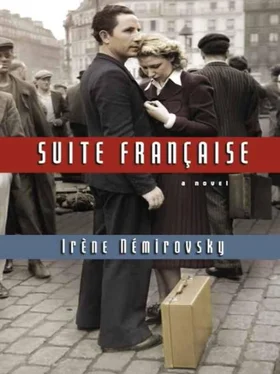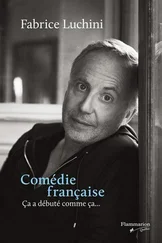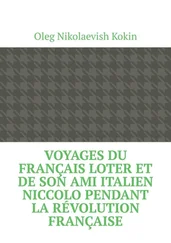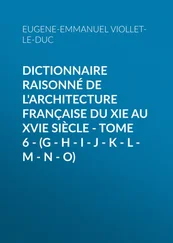[10] A character from the novel. (Editor)
[11] Austrian statesman and ambassador to Paris under Napoleon I.
Hitler:
FOR STORM IN JUNE:
What I need to have:
1 An extremely detailed map of France or Michelin Guide
2 The complete collection of several French and foreign newspapers between 1 June and 1 July
3 A work on porcelain
4 June birds, their names and songs
5 A mystical book (belonging to the godfather) Father Bréchard
Comments on what's already been written:
1 Will-He talks for too long.
2 Death of the priest-schmaltzy.
3 Nimes? Why not Toulouse which I know?
4 In general, not enough simplicity!
[In Russian, Irène Némirovsky added: "in general, they are often characters who have too high a social standing."]
April 1942. Need to have Storm, Dolce, Captivity follow on from one another. Replace the Desjours farm by the Mounain farm. I want to place it in Montferroux. Dual advantage: links Storm to Dolce and cuts out what is unpleasant in the Desjours household. I must create something great and stop wondering if there's any point.
Have no illusions: this is not for now. So mustn't hold back, must strike with a vengeance wherever I want.
For Captivity: the changing attitudes of Corte: national revolution, necessity of having a leader. Sacrifice (everyone agrees about the necessity of sacrifice just as long as it's your neighbour's), then the lapidary phrase[12] which makes him famous, for in the beginning Corte is rather frowned upon: he takes an attitude that is too French but he realises through subtle and menacing signs that this is not what he should do. Yes, he is patriotic but only afterwards: today the Rhine is flowing over the Ural mountains, he has a moment of hesitation but, after all, that is understandable given all the geographical fantasies which have become realities these past few years-the English border is at the Rhine and to top it all off the Maginot Line[13] and the Siegfried Line[14] are both in Russia, Horace's final creation (down him[15]).
[12] Paxton mentions Pétain's "lapidary formula" for defeat in his speech of 20 June 1940: "Too few allies, too few weapons, too few babies" (Robert O. Paxton, Vichy France, p. 21) and in his speech of 17 June 1940, Pétain stated: "the spirit of enjoyment has won out over the spirit of sacrifice" (ibid., p. 33). Similar sentiments are expressed in Dolce through the Perrin ladies (ch. 13) and the Viscount and Viscountess de Montmort (ch. 16).
[13] The Maginot Line was the line of defence built between 1927 and 1936 along the north-eastern border of France and Germany to prevent German attack.
[14] The Siegfried Line was the line of defence built between 1938 and 1940 along the western border of Germany. It was destroyed by the Allies in 1944-5.
[15] These final two words appear in English in the notebook.
On L.:[16] It must be him because he is a crook. And in the times we are living in, a crook is worth more than an honest man.
[16] This initial undoubtedly refers to Laval. (Editor)
Captivity -keep it simple. Tell what happens to people and that's all.
Today, 24 April, a little calm for the first time in a very long time, convince yourself that the sequences in Storm, if I may say so, must be, are a masterpiece. Work on it tirelessly.
Corte is one of those writers whose usefulness will become glaringly obvious in the years following the defeat; he has no equal when it comes to finding euphemisms to guard against disagreeable realities. E.g.: the French army was not beaten back, it withdrew! If people kiss the Germans' boots it is because they have a sense of reality. Having a communal spirit means hoarding food supplies for the exclusive use of the few.
I think I should replace the strawberries with forget-me-nots. It seems impossible to bring cherry trees in blossom and ripe strawberries together in the same season.
Find a way to link Lucile to Storm. When the Michauds stop to rest one night during their journey, this oasis and the breakfast and everything that must seem so wonderful-the porcelain cups, the dewy roses in thick bouquets on the table (roses with black centres), the coffee pot giving off bluish steam etc.
Send up the so-called writers. E.g. A. C, the A. R. who wrote an article "Is the Tristesse d'Olympio [17] a masterpiece?" No one has ever sent up certain so-called writers like A. B. etc. (there is honour among thieves).
[17] Famous Romantic poem by Victor Hugo.
To sum up, chapters already finished by 13 May 1942:
(1) Arrival (2) Madeleine (3) Madeleine and her husband (4) vespers (5) the house (6) the Germans in the village (7) the private school (8) the garden and the Viscountess's visit (9) the kitchen (10) departure of Mme Angellier. First look at the Perrins' garden (11) the day it rains.
TO DO:
(12) the German ill (13) the Maie woods (14) the Perrin ladies (15) the Perrins' garden (16) Madeleine's family (17) the Viscountess and Benoît (18) the denunciation? (19) the night (20) the catastrophe at Benoît's place (21) Madeleine at Lucile's house (22) the celebration at the lake (23) the de[parture].
Still to do: 12, half of 13, 16, 17, and the rest.
Madeleine at Lucile's house-Lucile in Mme Angellier's room-Lucile and the German-celebration at the lake-the departure.
FOR CAPTIVITY FOR THE CONCENTRATION CAMP THE BLASPHEMY OF THE BAPTISED JEWS "MAY GOD FORGIVE US OUR TRESPASSES AS WE FORGIVE YOU YOURS"-Obviously, martyrs would not have said that.
To do it well, need to make 5 parts:
1 Storm
2 Dolce
3 Captivity
4 Battles?
5 Peace?
General title: Storm or Storms and the first part could be called Shipwreck.
In spite of everything, the thing that links all these people together is our times, solely our times. Is that really enough? I mean: is this link sufficiently felt?
Therefore Benoît, after having killed (or trying to kill) Bonnet (for I still have to decide if it might not be better to let him live for the future), Benoît escapes; he first hides in the Maie woods, then, since Madeleine is afraid of being followed when she goes to bring him food, at Lucile's house. Finally, in Paris, at the Michauds' where Lucile sends him. Pursued, he escapes in time, but the Gestapo search the Michauds' house, find notes made by Jean-Marie for a future book, think they are political tracts and arrest him. He meets Hubert there [in prison] who had got himself arrested for some stupidity or other. Hubert would have no trouble getting out, because his powerful family who are total collaborators can pull strings, but out of childishness, his taste for adventure stories etc., he prefers risking his life by escaping with Jean-Marie. Benoît and his friends help them. Later, much later, because in the meantime Jean-Marie and Lucile have to fall in love, they escape and flee France. That should end Captivity and as I've already said:
– Benoît… Communist
– Jean-Marie… Middle class
Jean-Marie dies heroically. But how? And what is heroism these days? Parallel to this death, must show the death of the German in Russia, the two full of sorrowful nobility.
Adagio: Must rediscover all these musical terms ( presto, prestissimo, adagio, andante, con amore, etc.)
Music: Adagio from Op. 106, that immense poem of solitude-the twentieth variation on the theme of Diabelli, the sphinx with the dark eyebrows who contemplates the abyss-the Benedictus of the Missa Solemnis and the final scenes of Parsifal.
He [Hubert] gets out: those who truly love each other are Lucile and Jean-Marie. What should I do with Hubert? Vague plan: Benoît escapes after killing Bonnet. He's hidden at Lucile's. After the Germans leave, Lucile is afraid to have him stay in the village and suddenly thinks of the Michauds.
Читать дальше

![Константин Бальмонт - Константин Бальмонт и поэзия французского языка/Konstantin Balmont et la poésie de langue française [билингва ru-fr]](/books/60875/konstantin-balmont-konstantin-balmont-i-poeziya-francuzskogo-yazyka-konstantin-balmont-et-thumb.webp)










